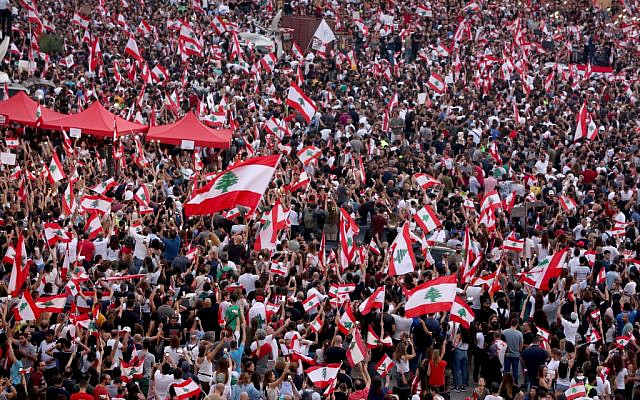The U.N. envoy to Lebanon Monday called for an investigation into alleged “excessive force” used against demonstrators after largely peaceful protests descended into violence over the weekend.
Unprecedented protests have rocked the country since October 17, demanding a complete overhaul of a political class they accuse of being incompetent and corrupt.
The street movement has been mostly peaceful, but on Saturday clashes between the demonstrators and security forces led to dozens being wounded in the most violent episode since the start of the protests. Clashes also erupted Sunday night.
U.N. special coordinator for Lebanon Jan Kubis called for “the identification of instigators of violence.”
An “investigation of the incidents as well as of use of excessive force by the security forces is necessary,” he said on Twitter.
“The violence and clashes over the weekend once again showed that postponements of a political solution of the current crisis create a fertile ground for provocations and political manipulation,” Kubis said.
The clashes on Saturday erupted at the entrance to the street leading to parliament, as security forces beat protesters who tried to breach metal police barricades.
An AFP photographer saw men in plainclothes bludgeoning protesters, while anti-riot police fired rubber bullets at protesters throwing stones.
The Lebanese Red Cross said both protesters and security forces were injured, with some affected by tear gas and others struck by hurled stones.
On Sunday night, protesters returned to central Beirut and a new round of clashes erupted for several hours – though it was less violent than the previous evening.
During both days, dozens were wounded on both sides.
Interior Minister Raya El Hassan has ordered a “rapid and transparent” inquiry into the violence, and acknowledged that the security forces had made “some mistakes”.
On Monday Hassan said on Twitter she had met with the head of security forces and stressed the “right to protest” under Lebanese law.
Amnesty International’s Diala Haidar on Sunday decried the “excessive use of force” in response to “an overwhelmingly peaceful protest.”
She denounced the presence of masked men in civilian clothes joining security forces in “violently attacking protesters.”
Prime Minister Saad Hariri caved in to street pressure and resigned on October 29, but bitterly divided political parties have failed to agree on a new premier to replace him.
Parliamentary consultations to name the new head of government have been postponed twice, the latest time on Monday.
More on the Subject


